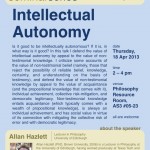 Is it good to be intellectually autonomous? If it is, in what way is it good? In this talk I defend the value of intellectual autonomy by appeal to the value of non-testimonial knowledge. I criticize some accounts of the value of non-testimonial belief (namely, those that reject the possibility of reliable belief, knowledge, certainty, and understanding on the basis of testimony), and defend the value of non-testimonial knowledge by appeal to the value of acquaintance (and the propositional knowledge that comes with it), individual achievement, collective risk-mitigation, and democratic legitimacy. Non-testimonial knowledge entails acquaintance (which typically comes with a wealth of propositional knowledge), is always an individual achievement, and has social value in virtue of its connection with mitigating the collective risk of error and with democratic legitimacy.
Is it good to be intellectually autonomous? If it is, in what way is it good? In this talk I defend the value of intellectual autonomy by appeal to the value of non-testimonial knowledge. I criticize some accounts of the value of non-testimonial belief (namely, those that reject the possibility of reliable belief, knowledge, certainty, and understanding on the basis of testimony), and defend the value of non-testimonial knowledge by appeal to the value of acquaintance (and the propositional knowledge that comes with it), individual achievement, collective risk-mitigation, and democratic legitimacy. Non-testimonial knowledge entails acquaintance (which typically comes with a wealth of propositional knowledge), is always an individual achievement, and has social value in virtue of its connection with mitigating the collective risk of error and with democratic legitimacy.
Philosophy Seminar Series.
Date: Thursday, 18 April 2013
Time: 2pm – 4pm
Venue: Philosophy Resource Room (AS3 #05-23)
Speaker: Allan Hazlett, Lecturer in Philosophy, University of Edinburgh
Moderator: Dr. Ben Blumson
About the Speaker:
 Allan Hazlett (PhD, Brown University, 2006) is a Lecturer in Philosophy at the University of Edinburgh, having worked previously at Texas Tech and Fordham Universities. He is the author of Luxury of the Understanding: On the Value of True Belief (Oxford University Press, forthcoming), and was the winner of the 2007 Rutgers Epistemology Conference Young Epistemologist Prize. Since 2012 he has served as the Secretary of the Scots Philosophical Association. He is currently working on the nature and value of the (so-called) intellectual virtues.
Allan Hazlett (PhD, Brown University, 2006) is a Lecturer in Philosophy at the University of Edinburgh, having worked previously at Texas Tech and Fordham Universities. He is the author of Luxury of the Understanding: On the Value of True Belief (Oxford University Press, forthcoming), and was the winner of the 2007 Rutgers Epistemology Conference Young Epistemologist Prize. Since 2012 he has served as the Secretary of the Scots Philosophical Association. He is currently working on the nature and value of the (so-called) intellectual virtues.